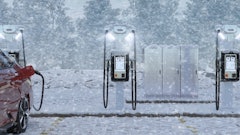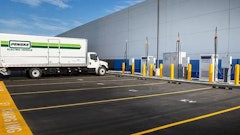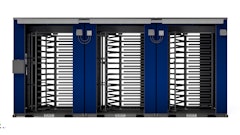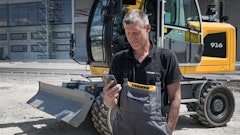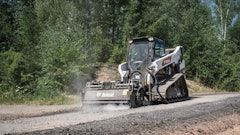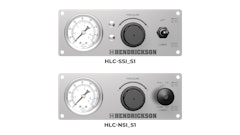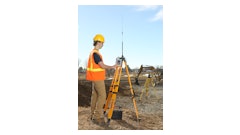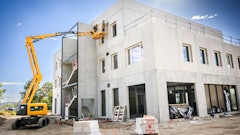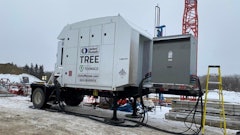
*This content is sponsored by Propane Education & Research Council (PERC)*
Propane-powered equipment can be found in all areas of construction, but customer demand is increasing in some key areas.
“A lot of concrete equipment is moving over to propane because it’s clean and can be used indoors. Floor scrapers, grinders, cutters and levelers, all propane powered. Forklifts and generators, too,” says Jim Bunsey, director of commercial business development at the Propane Education & Research Council (PERC).
Rental company leaders are finding that the energy source is a win-win for their businesses and their customers’. One of those leaders is Robert Pedersen, CEO of A Tool Shed Equipment Rentals and Equipment Rental Shared Interest Group chair for the American Rental Association (ARA).
“Propane is very prominent in Northern California,” says Pedersen, whose Santa Cruz-based business serves all of Silicon Valley. He says he has the most requests for propane track wheelbarrows and concrete buggies.
If you’re new to propane-powered equipment, here’s how everyone benefits:
Contractor Benefit: An Energy Source for a Variety of Jobsites
Contractors working on small or temporary jobsites without electricity are limited to gas fuel sources — and propane can be one of those options. It’s especially useful, as Bunsey mentioned, for indoors or indoors-outdoors projects done in under a week.
“A contractor can run the bigger, diesel equipment outside when they're pouring a couple hundred thousand yards (of concrete). But what about a few thousand yards? Or indoors?” Bunsey posits. “That's when the rental companies are offering propane-powered equipment.”
The same propane tanks can also fuel a generator on a jobsite for several days. The tanks are versatile and interchangeable among equipment. And they’re readily available.
Contractor Benefit: Lower Emissions = More Jobs
More municipalities are enacting restrictions around noise and odor from jobsites, especially near residential areas. And more large corporations are insisting contractors who bid make sustainability a priority. Lower-emission equipment has become a “must.”
Construction companies that offer a lower carbon footprint are more likely to win jobs versus those who use only traditional fuels. They’re also eligible for more jobs funded by the Infrastructure Improvement and Jobs Act.
“The push on construction sites is to have a lower carbon footprint,” Pedersen says.
Propane is an abundant low emission fuel and will be near-zero-emission in the near future as more renewable propane hits the market. Renewable propane is made from things like vegetable oil, animal fats and used cooking oil.
Emission ordinances, however, can be a double-edged sword. In California, where early clean energy movements championed propane, now some cities, like San Francisco, have enacted gas bans. Government mandates can be fickle. For instance, Berkeley’s natural gas ban was recently overturned. Ironically, propane and natural gas are energy sources that can ultimately power electric equipment.
“Everybody wants a clean environment. Let's start with (banning) the stuff that's really bad. There's this huge push for electric use… but until the infrastructure is built, there are other options that are better for the environment,” Pedersen says.
Contractor Benefit: Customers and Employees Love It
Propane’s sealed tank system isn’t just better for the environment. It’s also better for workers.
Where labor is hard to find, propane-powered equipment can be a selling point for contractors and make for more inclusive jobsites. It’s odorless and, in small quantities, doesn’t cause the headaches and respiratory effects common from diesel exhaust.
Bunsey says that as more people use propane- powered equipment at home — like with lawn mowers and generators — they know propane’s advantages.
“Construction sites for large weddings, NASCAR events and The Masters all use propane,” Bunsey says. “The consumer is now pushing the demand.”
Rental Company Benefit: Easy to Use and Less Maintenance
The reason homeowners love propane also makes it a good choice for rental businesses: It’s easy to use. Change out the tank, refuel periodically — that’s about all you have to do, says Bunsey.
“With propane fuel systems there's a lot less maintenance. You're not changing clogged fuel filters, you're not getting dirt build-up in the fuel system,” he says. “On my propane lawn mower, I simply change the oil and charge the battery every spring to get going.”
That’s especially important with rental equipment. Customers have been known to dump in the wrong gas, clog up the carburetors. Damage to engines and small components can add up for your business.
Also, if equipment sits too long at the store, the diesel or gasoline will break down. Not so for propane. Pedersen has found that storage is not an issue since most of his propane equipment doesn’t sit idle for very long.
Rental Company Benefit: Lower Cost Fuel, No Cost Infrastructure
It was 2015 when Pedersen, third- generation owner of his family’s business, was turned on to propane.
“Gas prices went up. We started converting some of our trucks to propane,” he said, pointing out that 20% of his vehicles are now running on propane. “Obviously since then, there’s been more talk about global warming and the need to go green. We'd already started converting a lot of things over for economic reasons.”
Once a rental company decides to commit to the whole propane infrastructure, the cost savings can be even more dramatic, Bunsey explains.
“If you sign a fueling agreement with most propane marketers, they're going to provide that equipment at close to no cost,” he says. “You’ll pay for it per gallon but won’t have the up-front cost. You’ll get the equipment, the pumps, the tanks, the storage sensor and it’s all built into the fueling cost.”
Rental Company Benefit: Grow Your Customer Base and Sales
Once that infrastructure is in place, there’s a whole new opportunity for ancillary revenue for your rental business.
“There are many people across the United States that make a living just selling 20-pound gas cylinders,” Bunsey says. “The customer comes in, rents their equipment, fuels up their equipment, and they can also do a cylinder exchange with the same piece of equipment.”
Bunsey says the main objection he hears is a fear that it will be hard to service these bottle sales, and that’s not so.
“Most of the training is done online. Every one of these propane marketers that would deliver to them will come in and train their people to be successful. And they'll realize that it becomes a big part of their business model.”
Pedersen can confirm: “It is a large part of our business.” How large? A Tool Shed sells a quarter million dollars of propane a year.
And that’s growing as more consumers and other commercial customers now come to their autogas filling station for their motor homes and buses, not to mention to power their consumer equipment.
“We had a massive amount of time that we were without power due to the fires, due to the storms. Many homeowners already used propane for heating and now have put in propane-powered generators for when the electric grid is down. Then they start using other propane powered equipment,” Pedersen says. “It's a viable alternative, inexpensive and available.”



